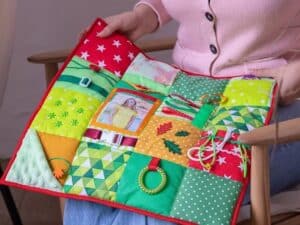Our senses, such as sight, smell, taste, touch and hearing, connect our minds with the world around us. Many of our older loved ones experience difficulties with some of their senses. People with Dementia may not always be able to make sense of complicated sensory stimuli. However, they can still enjoy the pleasant benefits of Tactile Stimulation of their senses.
There are no boundaries to sensory stimulation, including various activities. Making conscious tactile and tangible connections can benefit seniors with Dementia. Tactile Stimulation is a method employed to help individuals with Dementia connect to their environment with their sense of touch. The process can have tremendous psychological, emotional, and cognitive benefits.
What is Tactile Stimulation?
Tactile Stimulation is using physical stimuli to deliberately elicit a range of sensations through the sense of touch. Interaction with items of different textures, shapes, sizes, and consistency can help individuals with Dementia relate their sense of touch to things that surround them in their everyday lives.
Seniors living with the realities of Dementia often face sensory difficulties that can inhibit their experience of daily life in significant ways. Using Tactile Stimulation to help seniors with Dementia better connect with their sense of touch can play a role in adjusting to some of the challenging facets of life that accompany Dementia.

Benefits of Tactile Stimulation
Seniors with Dementia have a range of potential complications in daily life, like isolation, anxiety, apprehension, melancholy, confusion, and other negative emotions that can take their toll. The integration of Tactile Stimulation into seniors’ routines can help address and ease the intensity of some of these problems faced by individuals with Dementia.
Emotional Benefits
Tactile Stimulation can boost mood and a chance to interact and express oneself in a way that can help improve emotional health and self-esteem. Engaging with things tactilely can also help create a sense of calm that can ease anxiety and agitation.
Cognitive Benefits
As seniors focus on the objects and textures they interact with, concentration and critical thought come into play in ways that can help exercise the brain and improve cognitive fitness.
Social Benefits
Tactile Stimulation can be adapted to include social activity. It can take the form of friends and family getting together to engage in tactile connections, or it could be a group of fellow individuals living with Dementia working together to navigate and interact with the tactile world.

Integrating Tactile Stimulation
Integrating Tactile Stimulation into seniors’ lives doesn’t have to be complicated. It can be as straightforward as arranging the home environment to highlight different textures, sizes, and shapes. Or it could involve setting aside regular time for seniors to individually engage with distinct and varied objects. These simple steps can empower caregivers to make a significant difference in the lives of their loved ones.
There are countless ways for seniors to connect more often and more profoundly to their sense of touch. From petting animals to crafting, from massage to working with clay, the possibilities are endless. This variety can inspire caregivers to get creative and find the best methods for their loved ones.
- Petting Animals – running your fingers through an animal’s fur helps establish a solid connection and can reduce stress and anxiety.
- Crafting – engaging in finger painting, cutting and pasting, knitting, and other similar activities can be very stimulating.
- Massage – this is a great way to relieve tension and increase stimulation.
- Working with Clay – Playdough molding or creating sculptures with clay is often considered therapeutic and is a great way to establish a connection.
- Washing – even something as simple as using sponges with soap and water can be stimulating.
- Interpersonal Touch – hugs, handshakes, and other physical contact methods are effective for connecting with other individuals.
- Texture Exploration – involves actively sitting down with various objects of different textures to feel them in the hands or on the body. Some items to use may include fabrics, beads, sandpaper, stuffed animals, toys, liquids, lotions, or anything with an interesting texture.
Remember, Tactile Stimulation is already a part of seniors’ everyday lives. By making it a purposeful and mindful practice, caregivers can provide significant benefits for their senior loved ones dealing with Dementia. This reassurance can give caregivers the confidence they need to continue providing the best care possible.



